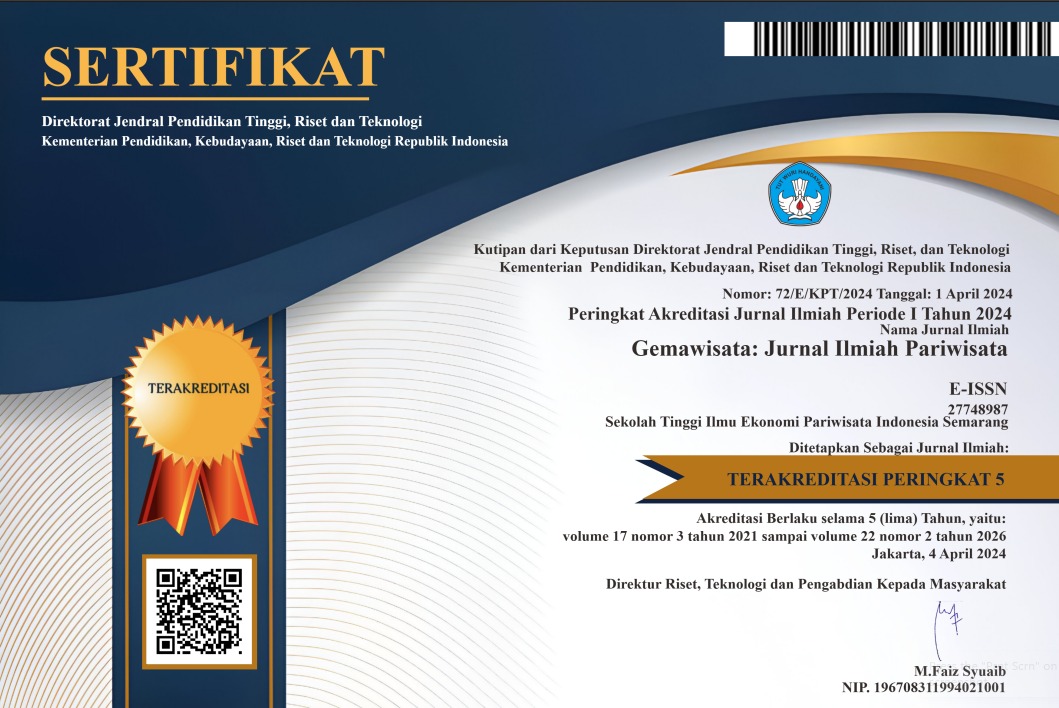Makna Hospitality Bagi Karyawan Front Office: Pendekatan Fenomenologi
DOI:
https://doi.org/10.56910/gemawisata.v21i3.861Keywords:
Hospitality, Front Office, Five-Star Hotel, Emotional Labor, Guest SatisfactionAbstract
This study aims to explore the meaning of hospitality as experienced by front office employees of five-star hotels in South Kuta, Bali, using a phenomenological approach. As the frontline in guest interactions, the subjective experience of employees significantly influences service quality, guest satisfaction, and the hotel's image. Data collection was carried out through semi-structured interviews with 18 informants, observation, and internal documentation. Data analysis followed a descriptive phenomenological procedure to produce rich contextual descriptions. The findings indicate that hospitality for front office employees is complex and influenced by both internal and external factors, including professional identity, emotional labor, and the quality of interpersonal relations with guests. Although existing theoretical frameworks are relevant, there are gaps between theory and practice in stress management and the effectiveness of compensation. Recommendations include the development of emotional training programs, non-financial rewards, and employee involvement in job redesign and retention strategies based on competence development. These strategies are expected to improve job satisfaction, service quality, and guest loyalty.
References
Abdou, A. H., El-Amin, M. A. M., Mohammed, E. F. A., Alboray, H. M. M., Refai, A. M. S., Almakhayitah, M. Y., Albohnayh, A. S. M., Alismail, A. M., Almulla, M. O., Alsaqer, J. S., Mahmoud, M. H., Elshazly, A. I. A., & Allam, S. F. A. (2024). Work stress, work-family conflict, and psychological distress among resort employees: A JD-R model and spillover theory perspectives. Frontiers in Psychology, 15, 1326181. https://www.frontiersin.org/articles/10.3389/fpsyg.2024.1326181/full
Creswell, J. W. (2013). Qualitative inquiry and research design: Choosing among five approaches (3rd ed.). Sage.
Creswell, J. W. (2013). Qualitative inquiry and research design: Choosing among five approaches (3rd ed.). SAGE Publications.
Dewi, N. L. P. D. T., & Putri, D. G. (2023). Preferensi tamu terhadap pelayanan room attendant di Four Points by Sheraton Bali Ungasan. Journal of Hospitality Accommodation Management (JHAM), 2(2), 77–86. https://ejournal.ppb.ac.id/index.php/jham/article/view/1120
Elshaer, I. A., et al. (2023). Front-line hotel employees' mental health and quality of life: The role of coping strategies. ScienceDirect. https://www.sciencedirect.com/science/article/pii/S2405844023041221
Elshaer, I. A., et al. (2024). From Data to Delight: Leveraging Social Customer Relationship Management to Enhance Customer Satisfaction. MDPI. https://www.mdpi.com/2078-2489/16/1/9
Haimi, N. F., et al. (2016). The Relationship Between Non-Financial Compensation Factors with Employees' Retention in a Selected Hotel Industry. Journal of Cognitive Sciences and Human Development. https://www.researchgate.net/publication/332039709_The_Relationship_Between_Non-Financial_Compensation_Factors_with_Employees'_Retention_in_a_Selected_Hotel_Industry
Liu, C. Y. N., et al. (2025). The Effects of Perceived Trust and Psychological Safety on Employee Loyalty and Job Performance in the Hospitality Industry. Nature Human Behaviour. https://www.nature.com/articles/s41599-025-05069-3
Magdy, A., & Salem, I. E. (2024). Insights from the Hotel Industry: Psychological and Sociological Perspectives on Employee Engagement and Customer Satisfaction. HRCak. https://hrcak.srce.hr/file/465475
Prentice, C. (2025). Work-life imbalance, burning out, feeling down, I will quit...: Exploring the relationships between role conflicts, employee well-being, burnout, and quiet quitting among hospitality employees. Journal of Hospitality & Tourism Research. https://www.tandfonline.com/doi/full/10.1080/19368623.2024.2389074
Rasool, S. F. (2024). Inclusion of JD-R Theory Perspective to Enhance Employee Engagement in the Hospitality Industry. SAGE Open. https://journals.sagepub.com/doi/abs/10.1177/21582440231220207
Scholze, A. (2024). The job demands-resources model as a theoretical lens for understanding employee well-being in the hospitality industry. International Journal of Hospitality Management, 102, 103115. https://www.sciencedirect.com/science/article/pii/S0747563224000451
Thapa, R. (2023). Employees' Motivation as the Mediating Role. ResearchGate. https://www.researchgate.net/publication/370827540_The_Impact_of_Compensation_towards_Employees'_Performance_Employees'_Motivation_as_the_Mediating_Role
Wijaya, H., Sukmamedian, H., Lubis, A. L., & Supardi. (2024). The role of front office staff in providing satisfaction and comfort for guests at Radisson Golf and Convention Center Batam. Journal of Management and Hospitality. https://mapindo.ejurnal.info/index.php/manajemen_pelayanan_hotel/article/download/315/221
Yoo, D. Y. (2023). The Hospitality Stress Matrix: Exploring Job Stressors and Their Impact on Front-Line Employees' Job Stress and Psychological Well-being. MDPI. https://www.mdpi.com/2071-1050/15/17/13116
Yusriani, S., Patiro, S. P. S., Prambudi, I. S., & Effendy, A. J. (2023). Exploring work stress and coping strategies in the hotel industry: A preliminary study. International Conference on Business, Economics & Management for Sustainable Future. https://www.researchgate.net/publication/373710745_Exploring_Work_Stress_and_Coping_Strategies_in_the_Hotel_Industry_A_Preliminary_Study


1_(1).jpg)






